Ocean photography lets us dive beneath the surface and see what lives hidden in the deep, blue, massive waters.
This year, the contest had nine categories, and the overall winner, the Ocean Photographer of the Year, was a 25-year-old marine biologist and amateur photographer - Jialing Cai. The Australian National Maritime Museum is hosting an exhibition including all of the winners' beautiful photographs, which will end in May 2024.
So, without further ado, we invite you to explore this year’s aquatic life through the eyes of these talented photographers.
More info:oceanographicmagazine.com|Instagram|twitter.com|Facebook|Instagram
This post may includeaffiliate links.
“I went to Florida with one dream: to capture beautiful images of manatees,” says Ayer. “With a local friend, we saw several manatees. The manatee in the picture came close to look at me and was suddenly perfectly positioned in front of the sun’s rays. I hope this photo helps raise awareness of the need to protect these mammals.”
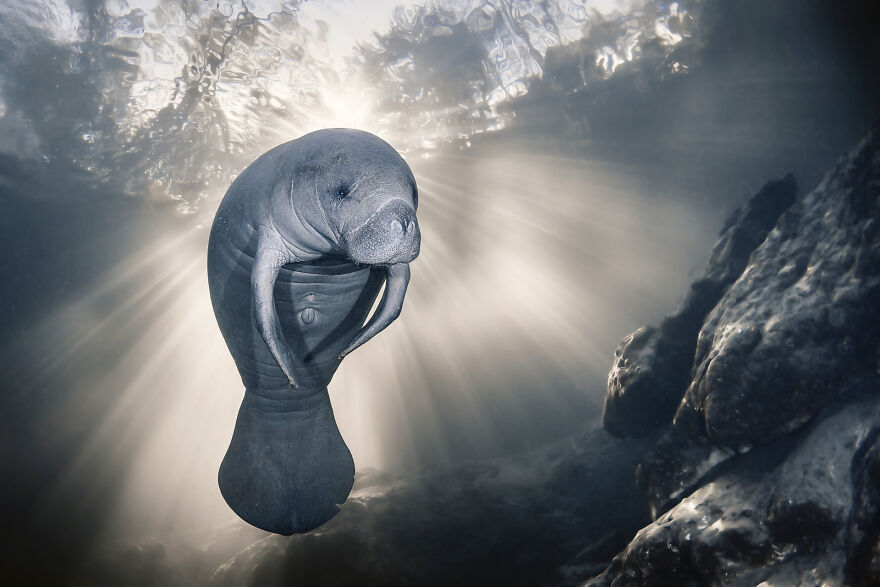
Bored Pandareached out toSylvie Ayer, the 1st place winner in the category ‘Conservation (Hope) Photographer of the Year’, who shared some insights into capturing the winning photo of a manatee.We asked Sylvia to tell us what inspired her passion for conservation photography, specifically focusing on marine life, such as manatees. Sylvia responded: “The ocean offers us incredible riches. Unfortunately, humans destroy them selfishly. The majority of the population does not know marine life. By taking pictures of animals, and especially those in danger of extinction, I hope that humans will become more aware of the urgency of protecting them.”
Bored Pandareached out toSylvie Ayer, the 1st place winner in the category ‘Conservation (Hope) Photographer of the Year’, who shared some insights into capturing the winning photo of a manatee.
We asked Sylvia to tell us what inspired her passion for conservation photography, specifically focusing on marine life, such as manatees. Sylvia responded: “The ocean offers us incredible riches. Unfortunately, humans destroy them selfishly. The majority of the population does not know marine life. By taking pictures of animals, and especially those in danger of extinction, I hope that humans will become more aware of the urgency of protecting them.”
“One of the ocean’s largest mammals, the humpback whale, lands gracefully on its back after launching its enormous frame out of the depths of the Pacific Ocean,” says Holton. “Studying whale behavior and understanding their motivations for breaching, coupled with endless hours spent optimizing flight and camera settings, helped to freeze this beautiful moment in time that I call ‘Imprint of a Giant’. The annual humpback whale migration up the east coast of Australia sees Sydney come alive with ever-increasing numbers of whales, bringing joy to everyone along the way.”
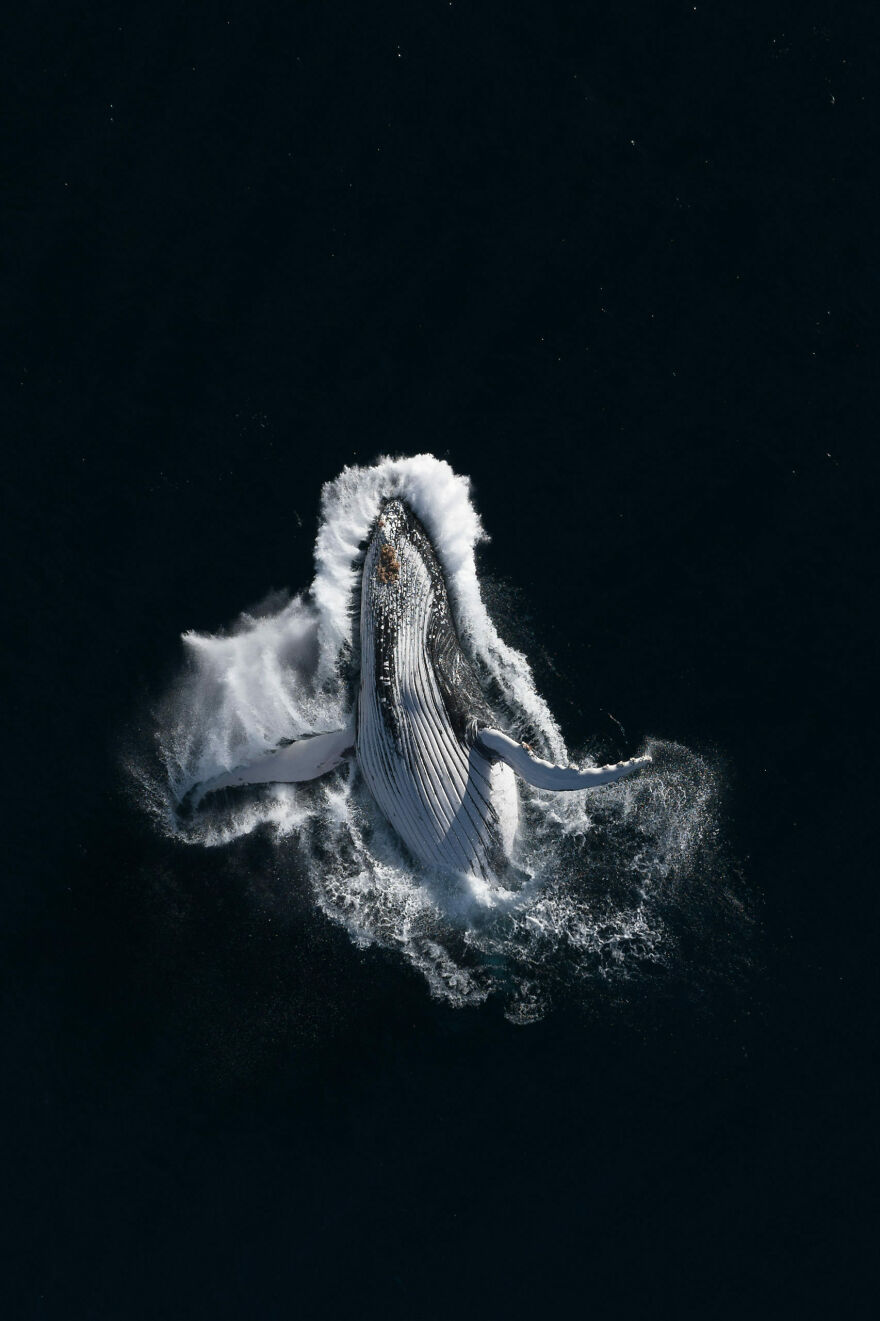
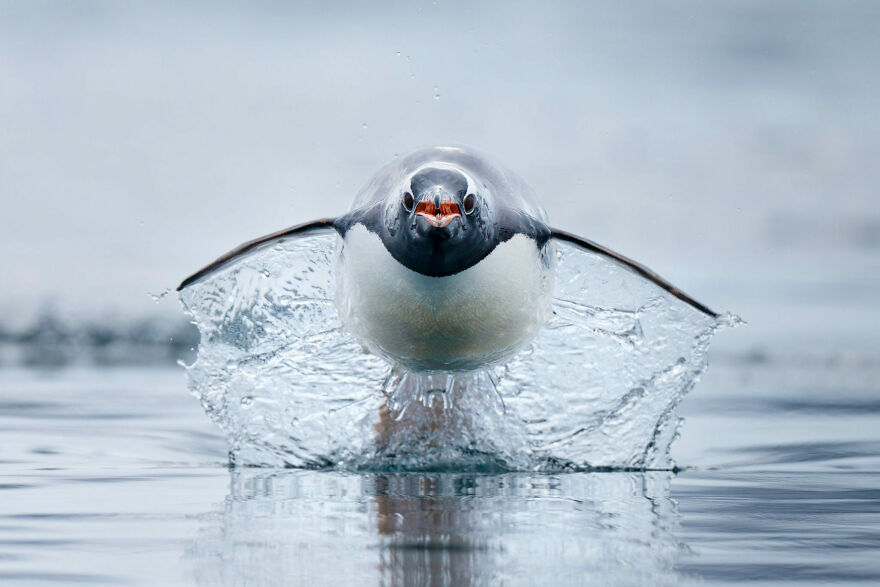
The natural lighting and composition made Sylvia’s image look divine. We asked the photographer to describe the process behind capturing this manatee and the role natural lighting played in enhancing its impact.“That morning it was very cold in Florida. Indeed, there was a very cold wind all over the eastern USA. When we got to our little boat there was even frost on it. I never thought I would see frost in Florida. So we rushed to load all our gear onto the boat. We sailed the river looking for manatees. When we found some, we went into the water as gently and slowly as possible so as not to disturb them.We swam slowly towards them and kept a sufficient distance. The light was indeed beautiful this morning, one like magic. A manatee saw me and came to me as if to look at what it was. I think this light brings hope for the conservation of this species and a very strong emotion. I even have a person who wrote to me that it was ‘the sacred manatee’.”
The natural lighting and composition made Sylvia’s image look divine. We asked the photographer to describe the process behind capturing this manatee and the role natural lighting played in enhancing its impact.
“That morning it was very cold in Florida. Indeed, there was a very cold wind all over the eastern USA. When we got to our little boat there was even frost on it. I never thought I would see frost in Florida. So we rushed to load all our gear onto the boat. We sailed the river looking for manatees. When we found some, we went into the water as gently and slowly as possible so as not to disturb them.
We swam slowly towards them and kept a sufficient distance. The light was indeed beautiful this morning, one like magic. A manatee saw me and came to me as if to look at what it was. I think this light brings hope for the conservation of this species and a very strong emotion. I even have a person who wrote to me that it was ‘the sacred manatee’.”
“Off Baja California Sur in Mexico, marlins annually congregate to feed on bait balls,” says Postigo. “After they diminish the fish present in quick and elaborate hunting rituals, only scales are left. Here, a blue marlin swims beneath the ocean’s surface, fish scales - resembling a starry sky - raining down around it.”
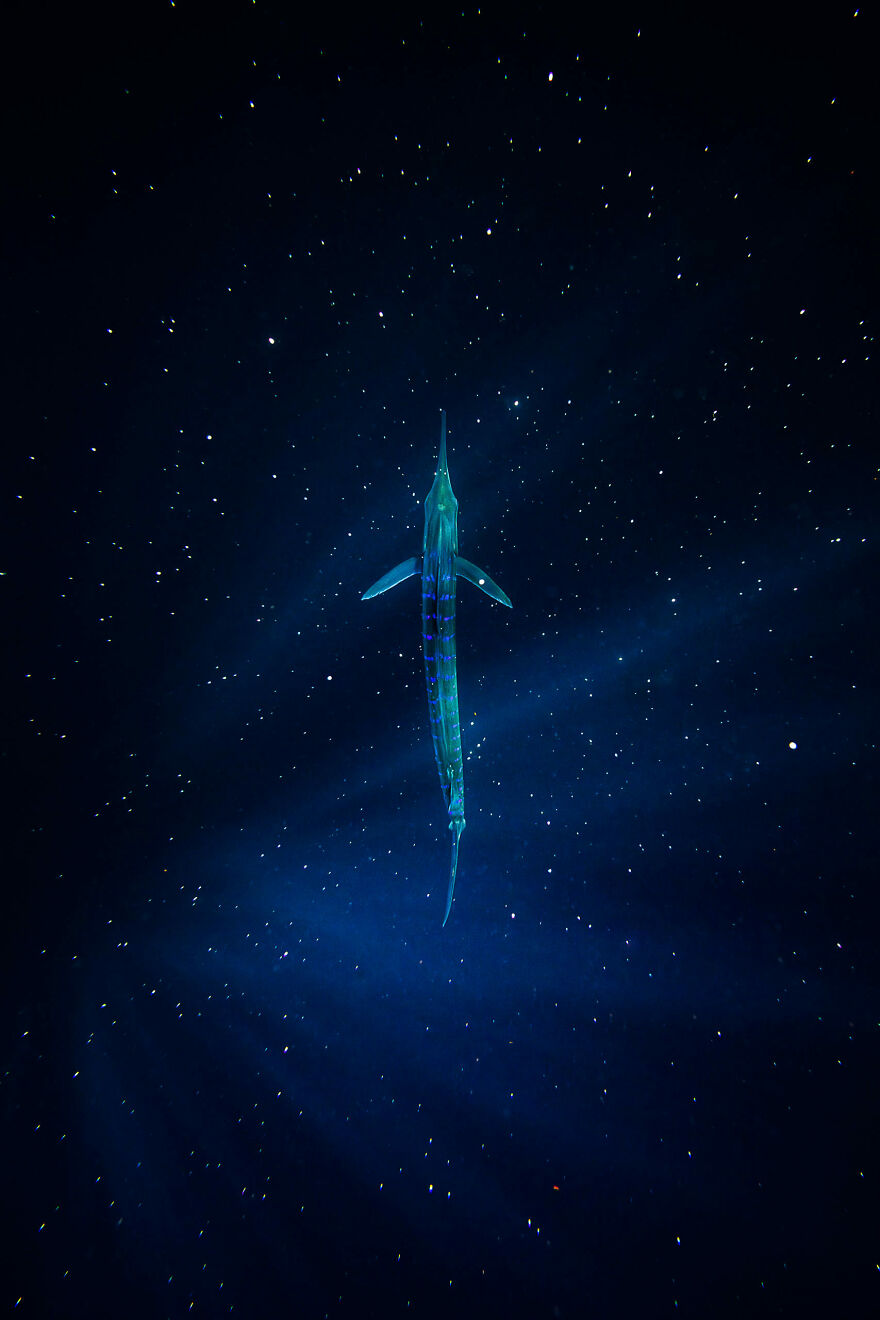
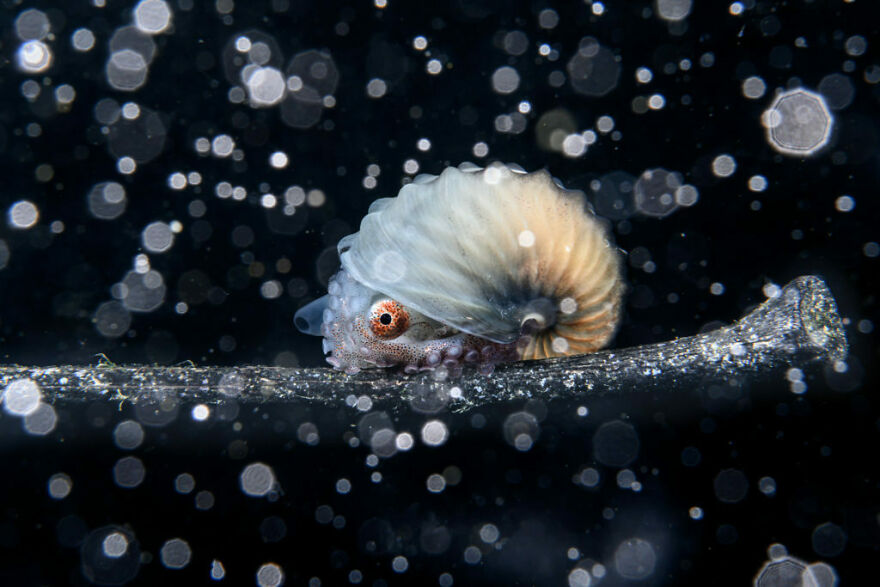
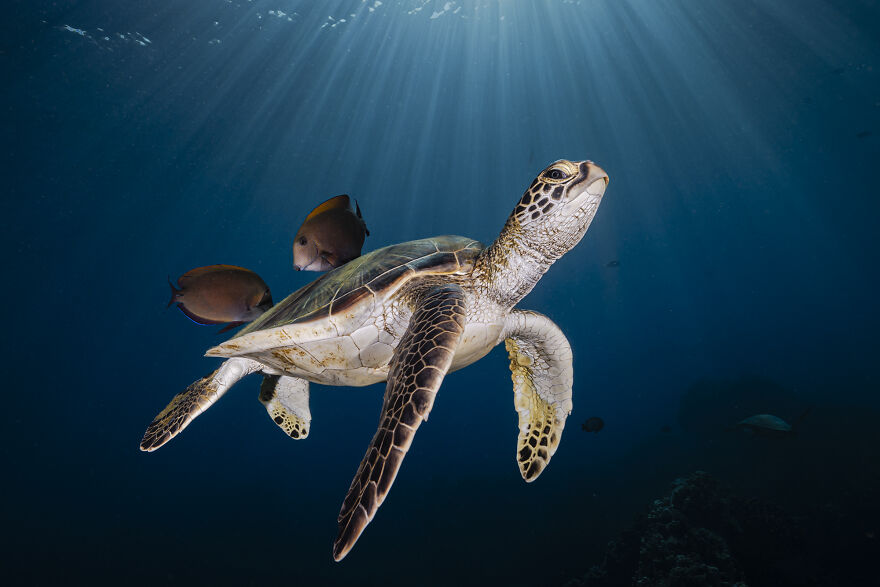
“In the Pacific Ocean’s crystal clear waters, these four Chilean devil rays glided gracefully around me,” says Llobera. “With my camera ready and my body submerged, I waited for the opportune moment to freedive and capture the sublime beauty of their aquatic ballet.”
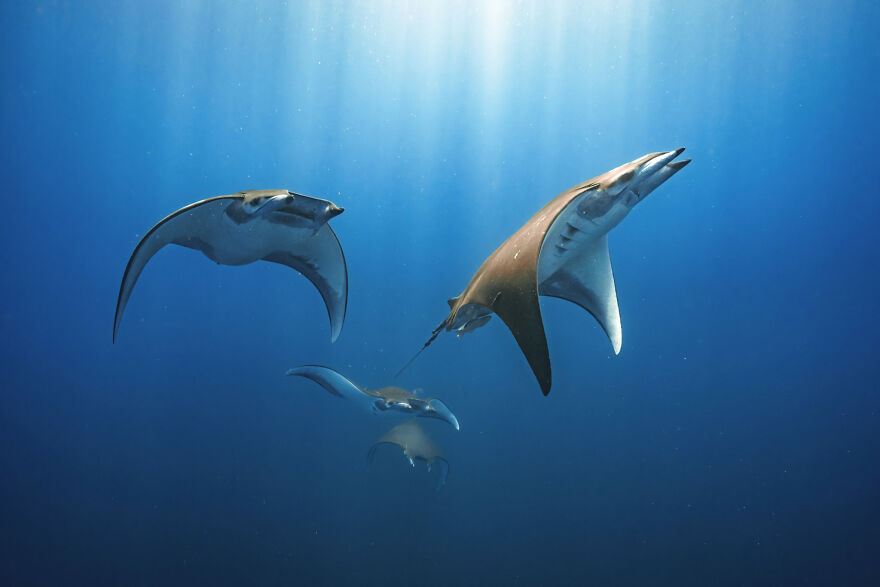
And lastly, Sylvia shared challenges and memorable moments that she encountered while trying to capturethis photo.“The challenge was the icy wind that was blowing that weekend. I’m Swiss. I left my country for Florida in the winter. And I never thought I’d be able to live through that cold there. I didn’t bring warm enough clothes. Luckily under the water, it was okay. It was better than outside.”
And lastly, Sylvia shared challenges and memorable moments that she encountered while trying to capturethis photo.
“The challenge was the icy wind that was blowing that weekend. I’m Swiss. I left my country for Florida in the winter. And I never thought I’d be able to live through that cold there. I didn’t bring warm enough clothes. Luckily under the water, it was okay. It was better than outside.”
“In the breathtaking Arctic landscape of Svalbard, Norway, a poignant scene unfolds,” says Ledoux. “In this impactful capture, we glimpse both beauty and fragility, a stark reminder of the urgent need to preserve this majestic realm urging us to safeguard our precious Arctic for generations to come. The polar regions are vital for the entire planet. Without the icy regions, the stability of our world is collapsing.”
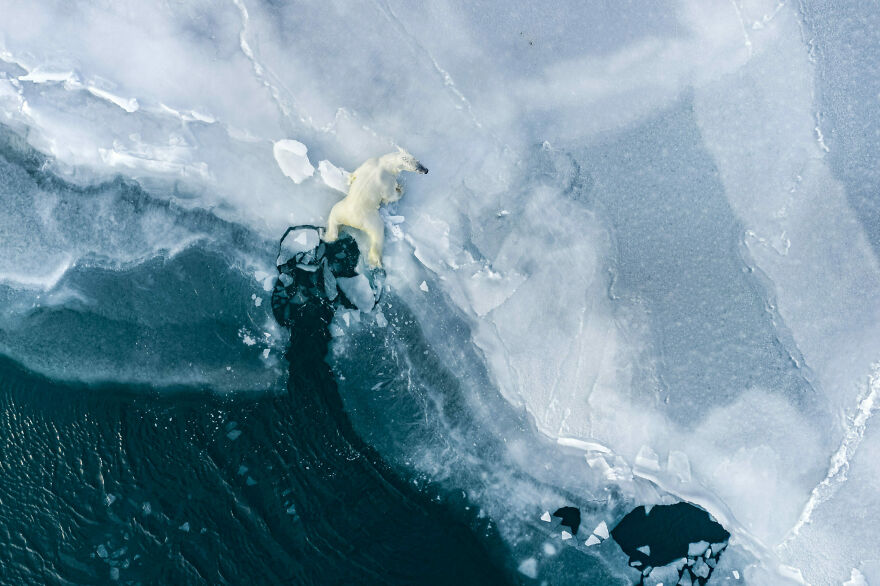
“I wanted to take this perfectly mirrored picture for a while now,” says Barathieu. “I already located the right spot for it, but had to wait for the great low tides which only occur two or three times a year. To create this mirror shot, I had to wait for all the ripples to fade. For that, it was necessary to move as little as possible. I had to completely exhale the air from my lungs so that I would sink without stirring up any sediment. I waited in expiratory apnea for at least a minute before taking the shot with a perfect angle of the camera.”
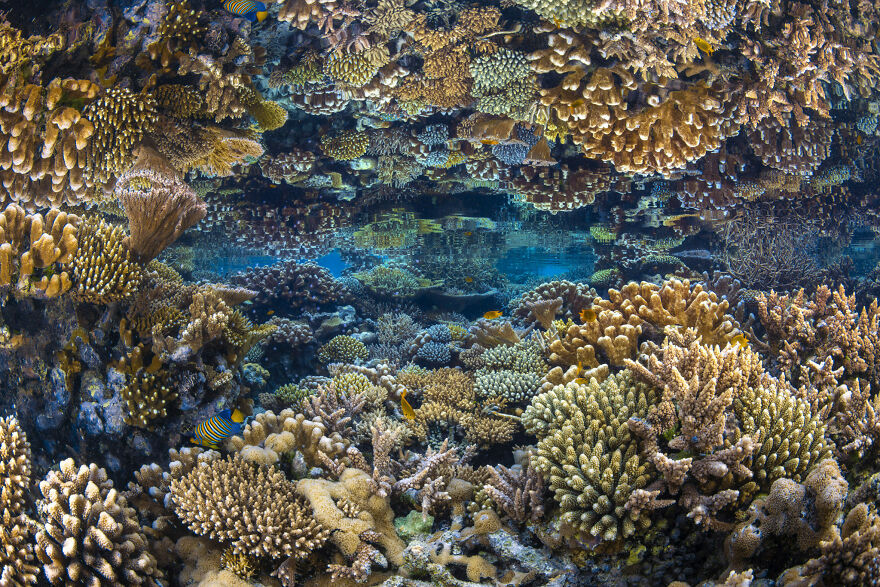
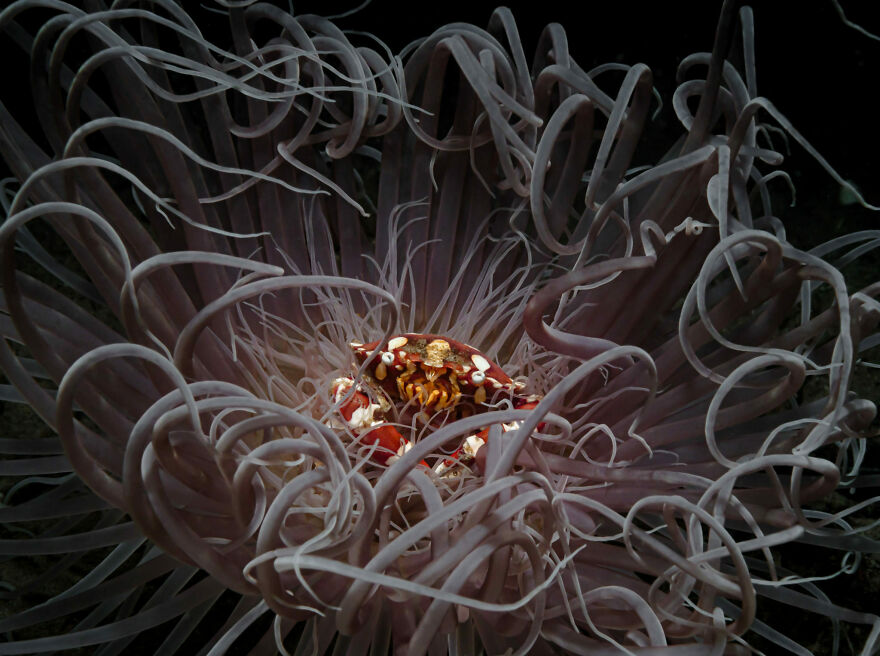
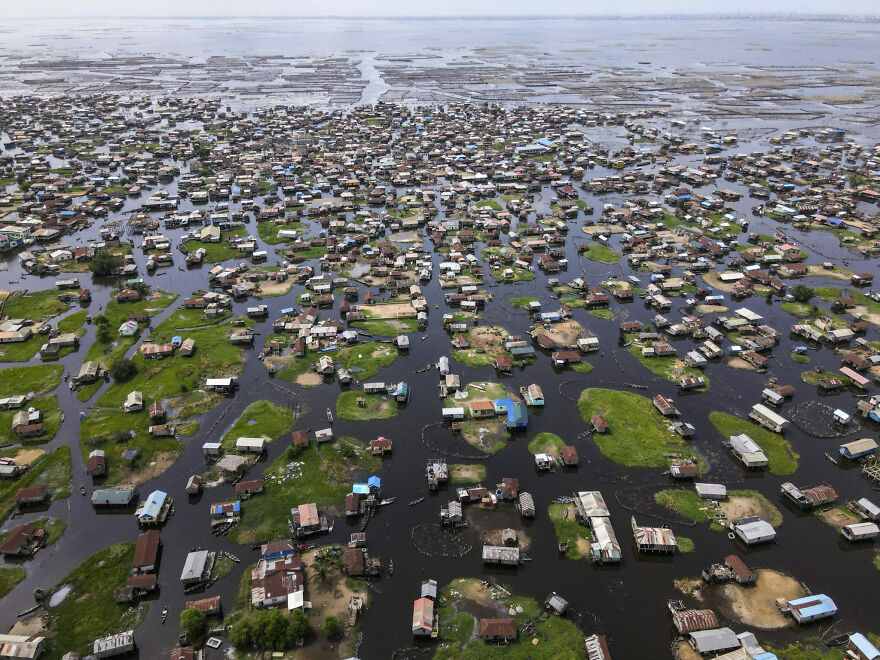
A scuba diver swims close to an iceberg in Tasiilaq, East Greenland. “Approximately 90% of the ice mass of an iceberg is hidden below the surface,” says Banfi, “and I wanted to show these Arctic giants from a new perspective. Underwater, their structures are completely different and their shapes and textures are constantly changing. You quickly notice that every iceberg is alive; they creak, move, and breathe. When you’re down there listening to the crackling from this frozen fortress, you feel very small.”
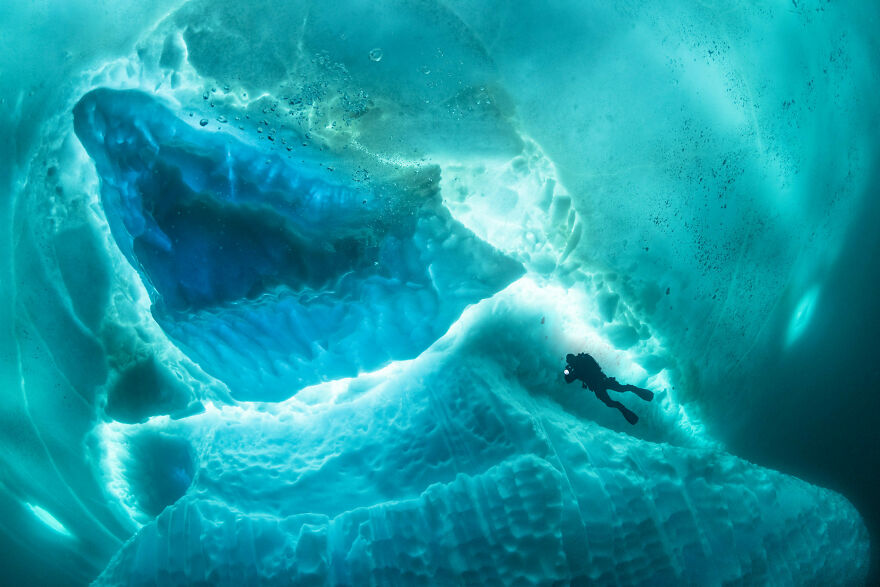
Two pale octopuses sit on a pipe. “The story behind this image is one of an ingenious conservation effort,” says Casey. “Two divers had the idea to build an artificial reef at Rye in Port Phillip Bay to attract octopuses to the area and provide them with a safe place to reproduce. Virtually overnight, the artificial reef exploded with marine life. The pale octopuses loved their new safe environment and quickly dominated the reef. Several pipes were secured to provide a place for these octopuses to lay their eggs. In my photograph, a male approaches a female during their early courting stages. After mating, the female eventually settled in the pipe and laid her eggs.”
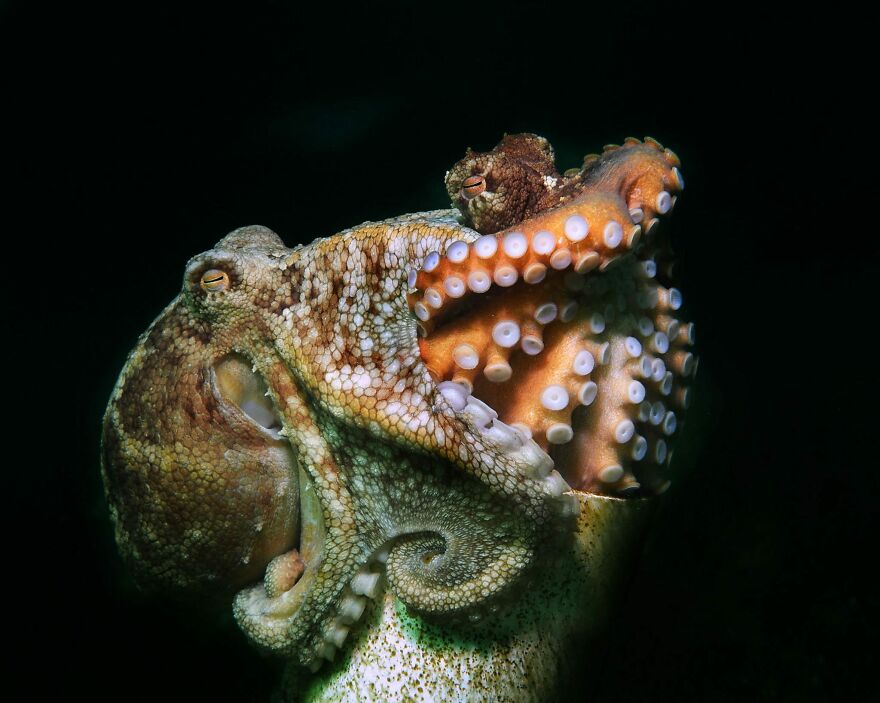
A lizardfish’s open mouth reveals a surprise. “It seemed that the lizardfish was trying to swallow the other fish tail-first before it got stuck in its throat,” says Pokoj. “Both fish looked to be in some distress. Lizardfish are ambush predators and swim away if a diver gets too close, so this behaviour was highly unusual. The lizardfish kept its mouth open as if it wanted the fish inside its mouth to escape.”
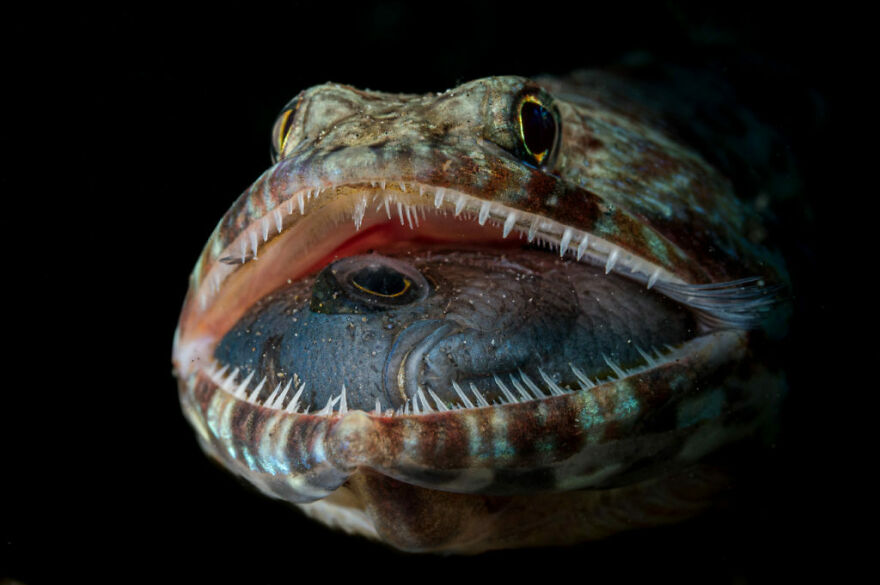
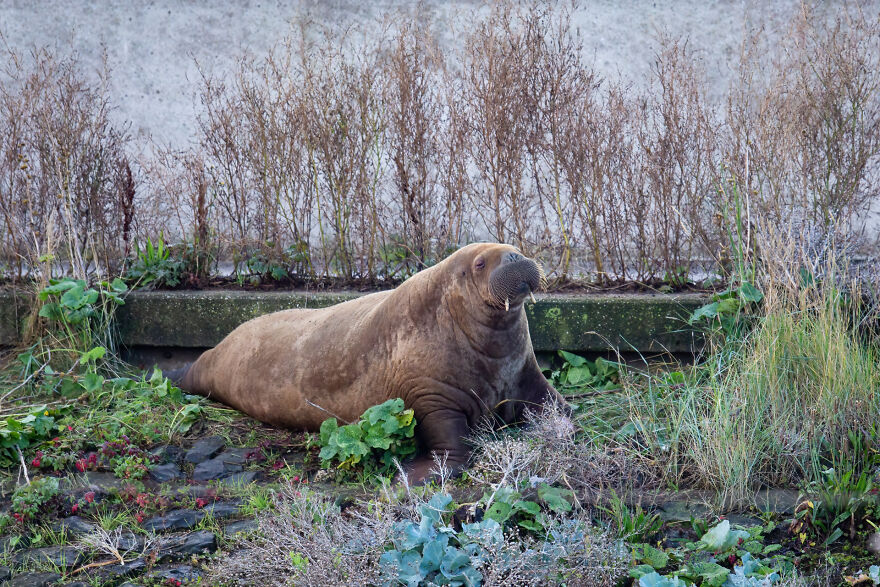
See Also on Bored Panda
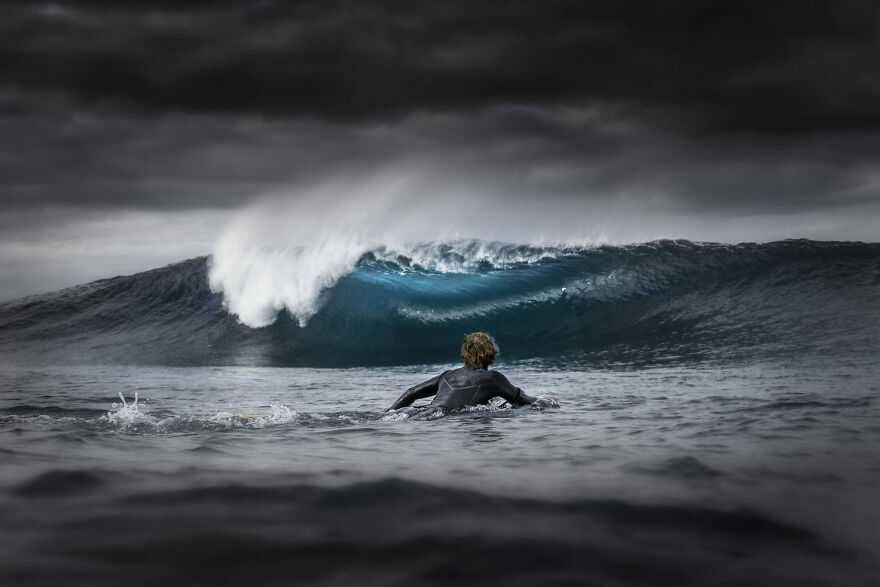
“Like a bolt of lightning piercing black clouds, this small common squid exploded onto the scene before me,” says Sanders. “Jetting around, it refused to stay still, seemingly intent on exploring our torch light. After observing its movements for some time, I decided to try to capture its trail of motion using rear curtain sync. After a few attempts, I was having some success. Then, all of a sudden, as I pressed the shutter, the little squid shot off jetting a plume of ink into the black water.”
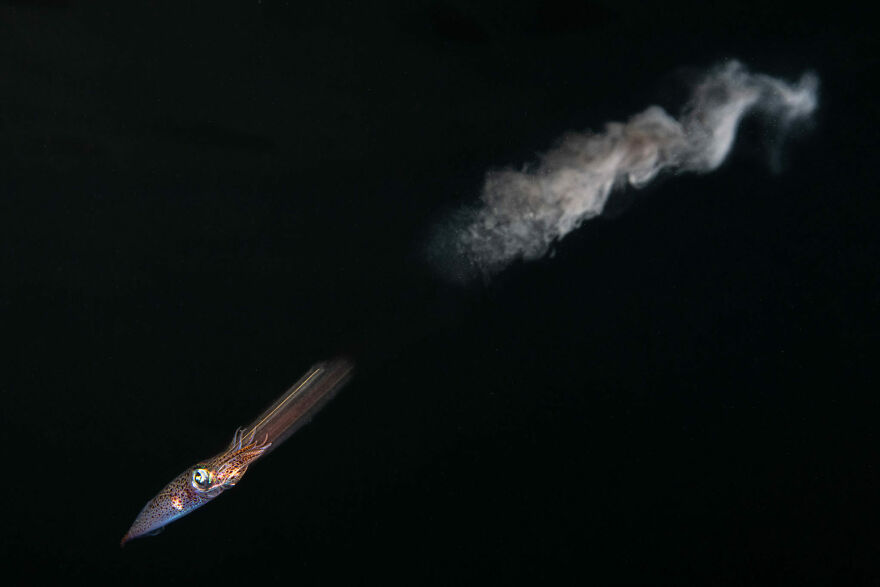
“Every year, Baja California is home to one of the largest sardine runs in the world, attracting predators like sea lions, whales, and striped marlin,” says Zhou. “On this occasion, several striped marlin circled below, taking turns rushing up into the baitball to hunt. I dove down when I saw one of the marlin starting to make its way toward the baitball and captured this photo.”
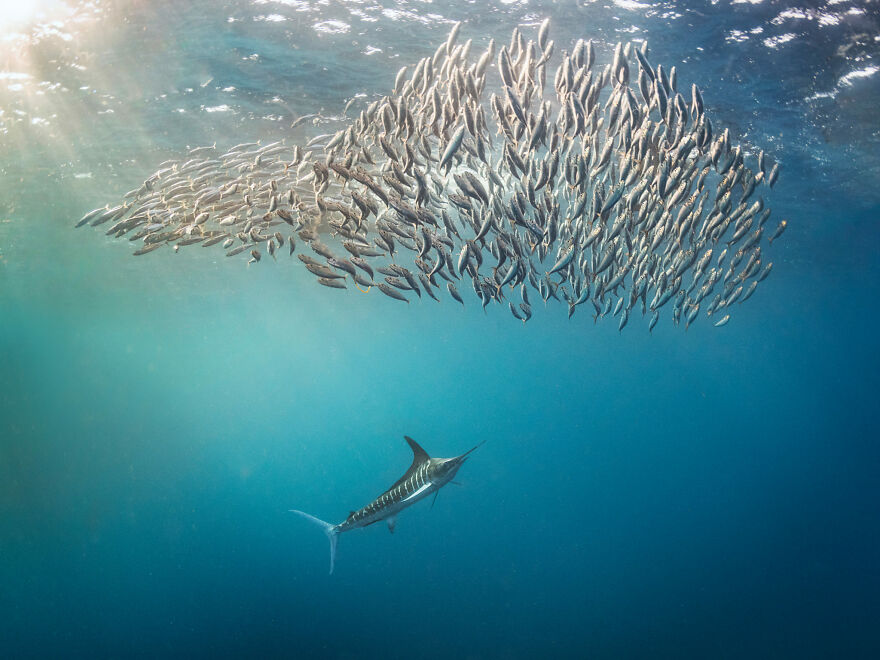
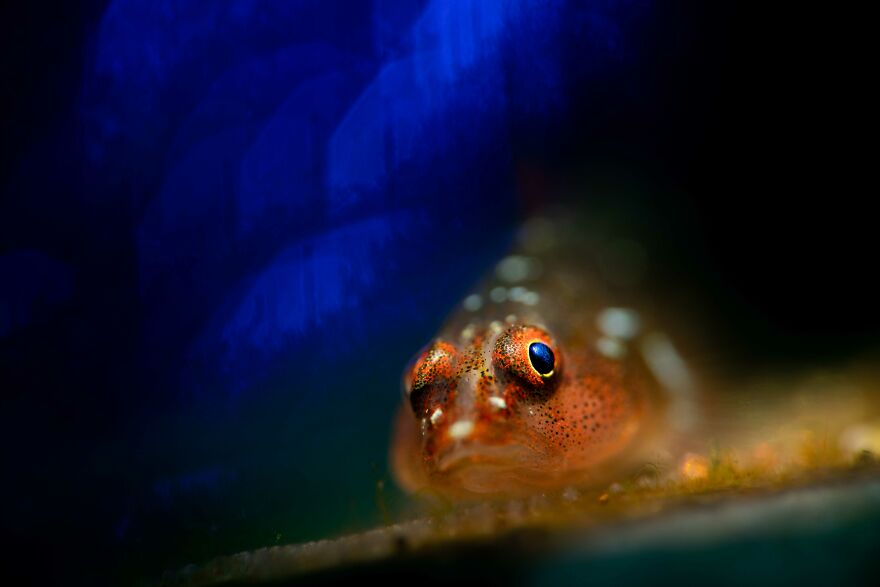
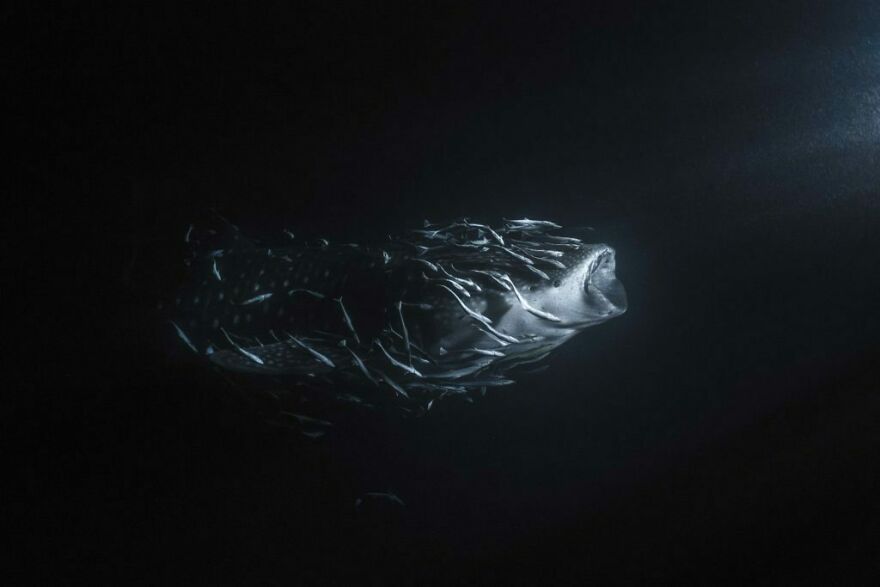
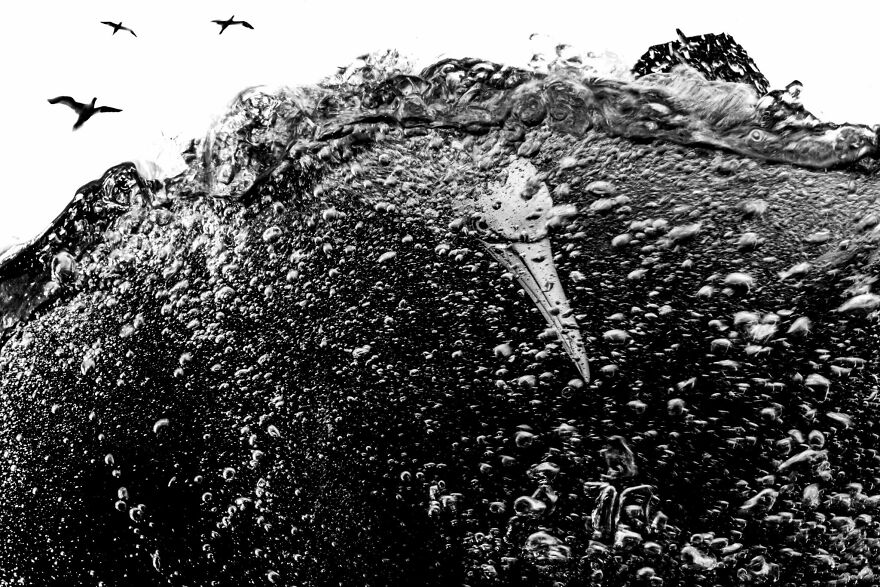
Balaram Stack surfs at Banzai Pipeline on the North Shore of O’ahu. “I took this image with a drone which was new to me,” says Glaser. “I have photographed the Pipeline from every angle but have never seen it from above. I managed to get the swell, weather, wind, tide, and talent all in one shot. The rainbow at the edge of the wave is what made this one so special to me.”
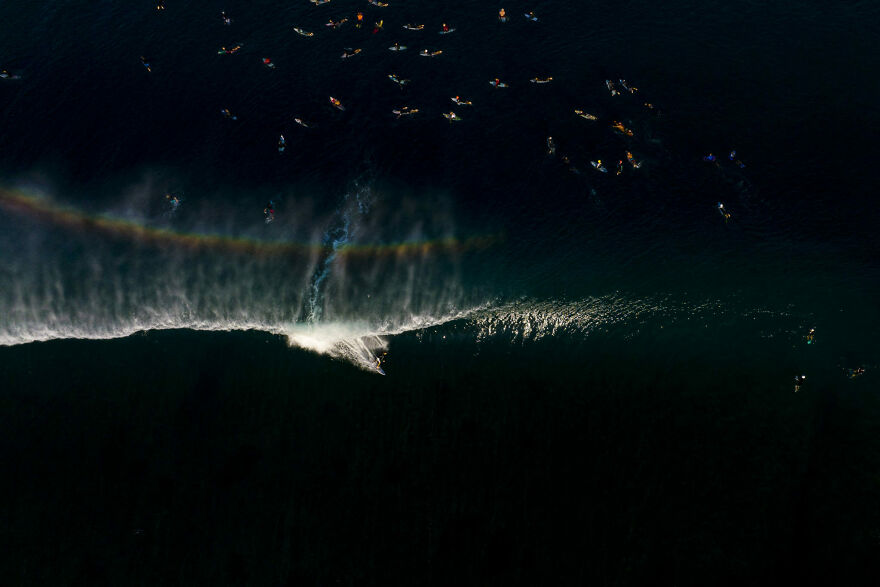
“A humpback whale dies a slow and painful death after being entangled in ropes and buoys, rendering its tail useless,” says Lopez-Beltran. “The image is a sad metaphor for the slow and painful death that we are inflicting upon our ocean planet.”
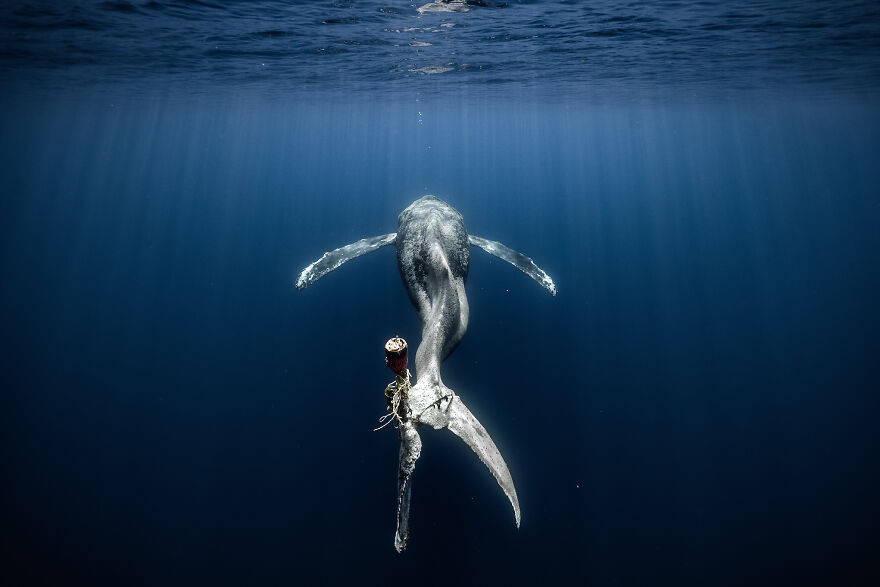
“This afternoon was one that I am never going to forget,” says Rugli. “A big swell reached Sydney’s coastline with some waves reaching over 10 feet in height. Very few surfers had the courage to fight with these monsters. It was just before sunset, and the sky was covered with clouds. I didn’t expect any colors, but just before the sun reached the horizon, a gap opened up, and the setting sun painted the whole sky with mysterious red light. I wanted to create a dreamy feeling and started to shoot with a slow shutter speed to capture the unique scene.”
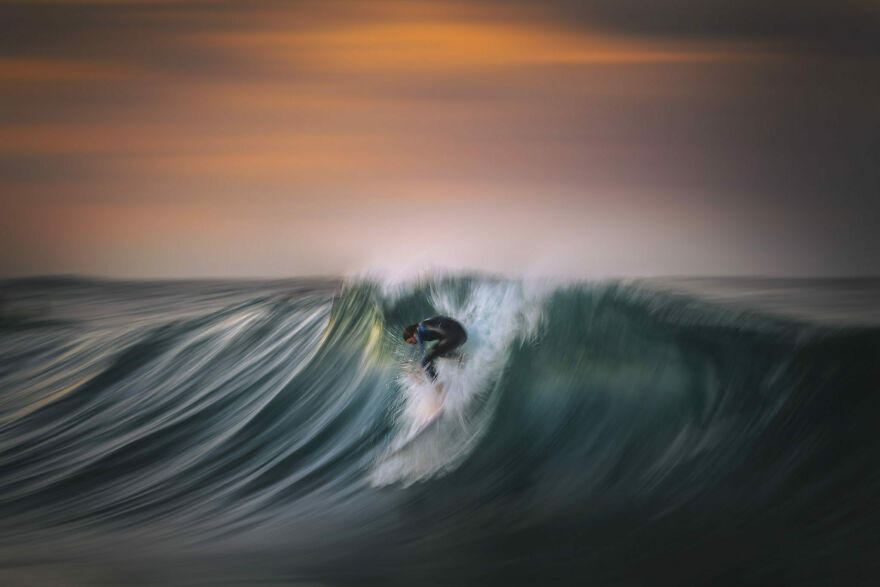
“On a stormy grey morning, a rider is confronted with a dead whale,” says Hoekendijk. “Both horse and rider appear to salute the whale, a victim of a mass stranding of 30 whales around the North Sea. Scientific papers hypothesised that strong solar storms had interfered with the whales' natural ‘GPS’, deceiving them into these shallow waters.”
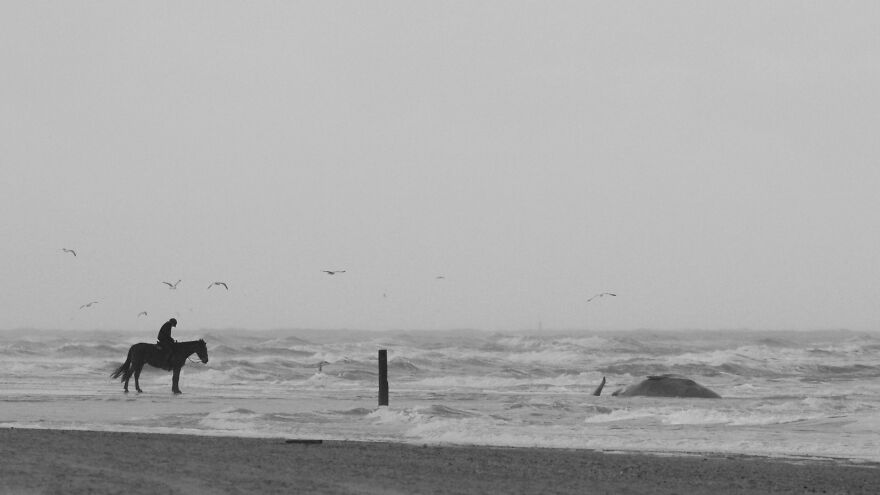
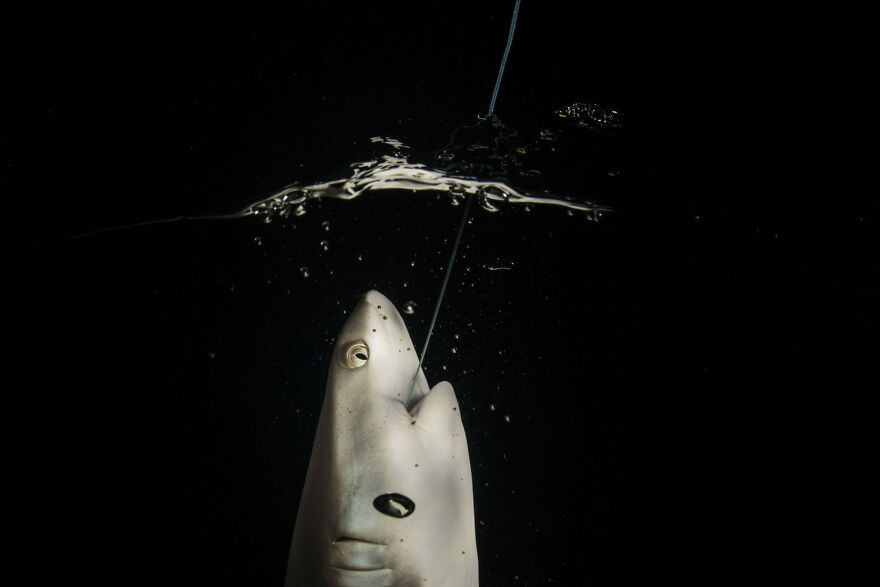
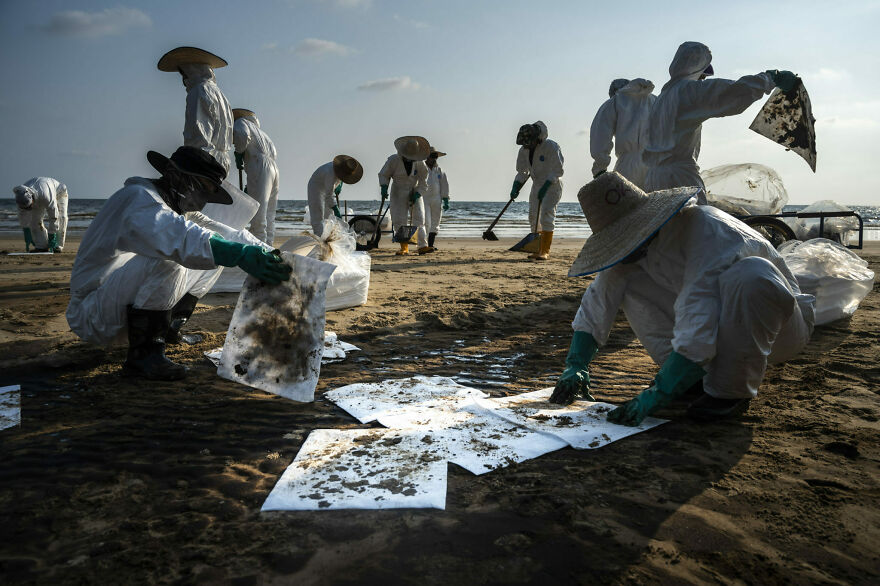
“Humans have enjoyed the gifts of the sea for generations,” says Wang. “In China, these artisanal fishing fences stood proudly in the sea. I tried to capture this sense of pride and history in my image.”
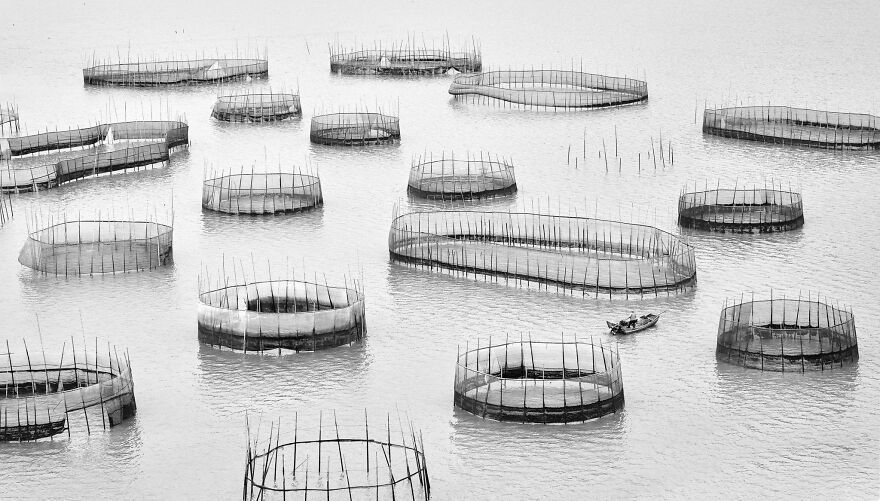
Modal closeAdd New ImageModal closeAdd Your Photo To This ListPlease use high-res photos without watermarksOoops! Your image is too large, maximum file size is 8 MB.Not your original work?Add sourcePublish
Modal close
Add New ImageModal closeAdd Your Photo To This ListPlease use high-res photos without watermarksOoops! Your image is too large, maximum file size is 8 MB.Not your original work?Add sourcePublish
Modal closeAdd Your Photo To This ListPlease use high-res photos without watermarksOoops! Your image is too large, maximum file size is 8 MB.Not your original work?Add sourcePublish
Add Your Photo To This ListPlease use high-res photos without watermarksOoops! Your image is too large, maximum file size is 8 MB.
Add Your Photo To This List
Please use high-res photos without watermarks
Ooops! Your image is too large, maximum file size is 8 MB.
Not your original work?Add source
Modal closeModal closeOoops! Your image is too large, maximum file size is 8 MB.UploadUploadError occurred when generating embed. Please check link and try again.TwitterRender conversationUse html versionGenerate not embedded versionAdd watermarkInstagramShow Image OnlyHide CaptionCropAdd watermarkFacebookShow Image OnlyAdd watermarkChangeSourceTitleUpdateAdd Image
Modal closeOoops! Your image is too large, maximum file size is 8 MB.UploadUploadError occurred when generating embed. Please check link and try again.TwitterRender conversationUse html versionGenerate not embedded versionAdd watermarkInstagramShow Image OnlyHide CaptionCropAdd watermarkFacebookShow Image OnlyAdd watermarkChangeSourceTitleUpdateAdd Image
Upload
UploadError occurred when generating embed. Please check link and try again.TwitterRender conversationUse html versionGenerate not embedded versionAdd watermarkInstagramShow Image OnlyHide CaptionCropAdd watermarkFacebookShow Image OnlyAdd watermark
Error occurred when generating embed. Please check link and try again.
TwitterRender conversationUse html versionGenerate not embedded versionAdd watermark
InstagramShow Image OnlyHide CaptionCropAdd watermark
FacebookShow Image OnlyAdd watermark
ChangeSourceTitle
You May Like40 Captivating Street Shots Curated By “Pure Street Photography"Community Panda86 Photography Hacks To Take Your Photos To The Next LevelAivaras KaziukonisPhotographer Assembles Aerial Photos To Showcase The Immense Scale Of Human Impact (17 Pics)Community Panda
Community Panda
Aivaras Kaziukonis
Photography